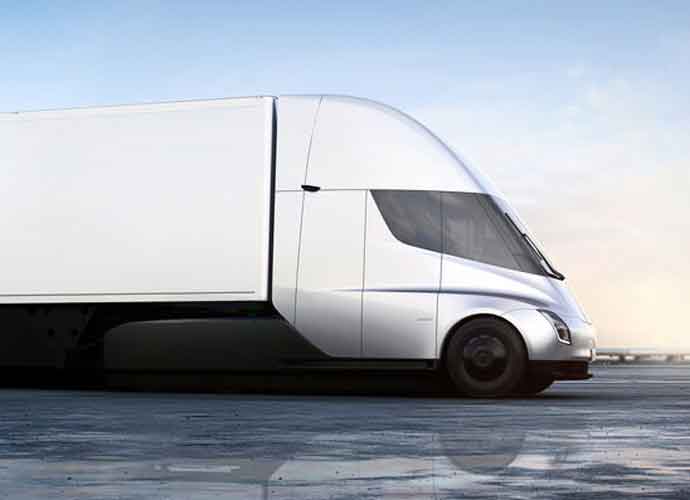Tesla Unveils Electric Big Rig Truck, Semi
Tesla on Thursday unveiled a new prototype electric big rig truck which will begin production in 2019.
Chief Executive of the automotive and energy company, Elon Musk, unveiled the electric big rig, called the Tesla Semi, by riding it into an airport hangar near Los Angeles.
Musk, 46, described the new electric trucks as Tesla’s next effort to move the economy away from its dependency on fossil fuels through projects including electric cars, solar roofs and power storage.
The Tesla Semi, according to Musk, is able to drive up to 500 miles with maximum cargo weight at highway speed. The electric big rig is capable of going from 0 to 60mph in five seconds without any cargo or 60mph in 20 seconds with a weight of 80,000 pounds, the maximum weight allowed on U.S. highways.
The battery for the truck is built into the chassis and each of the four rear wheels has its own motor. The truck’s cab is designed to be roomier than a classic big rig and has a center seat, flanked by two touch screens, for better visibility. The truck also has Tesla’s latest semi-autonomous driving system. The system is design to keep a vehicle in its lane without drifting, change lanes on command, and transition from one freeway to another with no human intervention. The electric big rig can charge for 30 minutes and then travel 400 miles, executives said.
Tesla faces more competition for electric trucks than it did with the market for electric cars. As regulators crack down on carbon dioxide pollution, manufacturers such as Daimler AG and Volkswagen are racing to overcome the challenges of substituting batteries for diesel engines. However, unlike most manufacturers that are focused on medium-duty trucks, Tesla is interested solely on the heavy big-rig market.
With Tesla Semi’s unveiling some analysts fear the truck will be an expensive distraction for the automotive and energy company. Tesla, which has never posted an annual profit, described itself as being in “manufacturing hell” with the production of its Model 3 sedan. Despite this, shares of Tesla have risen to 46 percent in 2017, making it the No. 2 U.S. automaker by market value.
As of yet, Musk has not listed a price for the truck.
RELATED ARTICLES
Get the most-revealing celebrity conversations with the uInterview podcast!




 Click here for the In Memoriam: Celebrities Who Died In 2017 Slideshow
Click here for the In Memoriam: Celebrities Who Died In 2017 Slideshow



Leave a comment